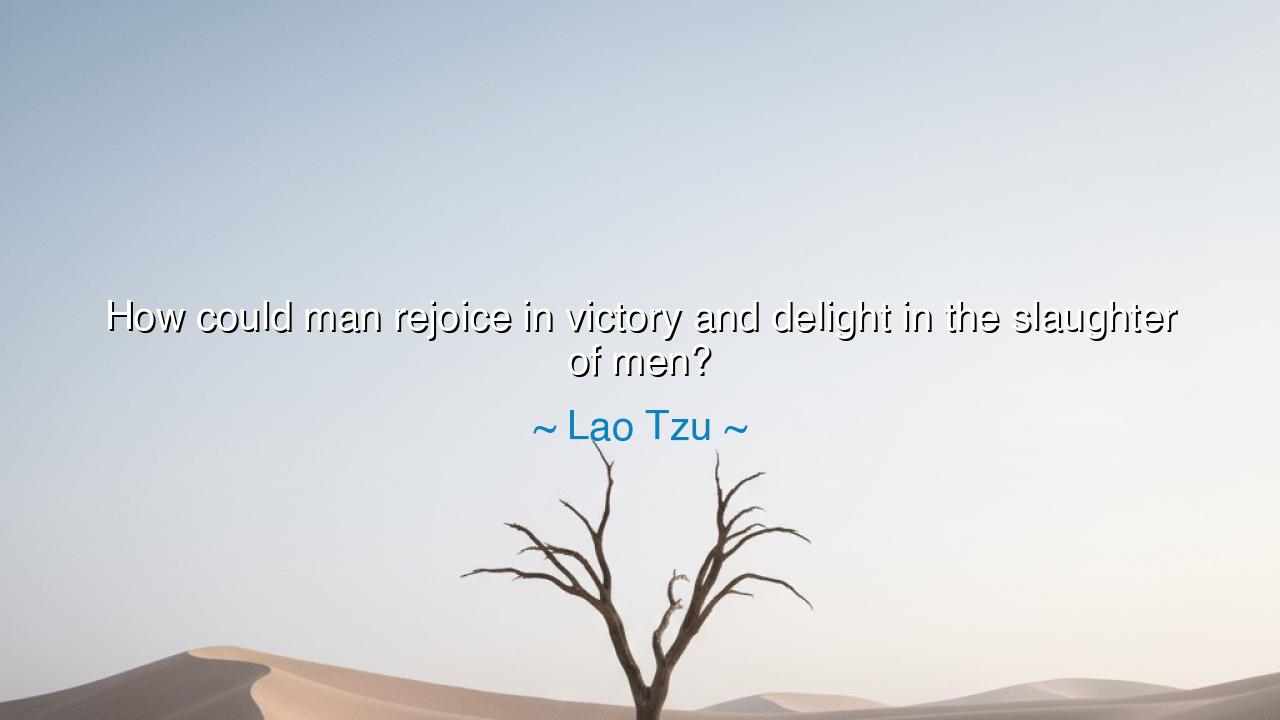
How could man rejoice in victory and delight in the slaughter of






Hear the quiet but piercing words of the sage Lao Tzu, father of the Tao, who asked: “How could man rejoice in victory and delight in the slaughter of men?” These words are not only a question, but a rebuke cast across the ages. They challenge the very heart of human pride, that strange tendency to celebrate war as triumph while ignoring the rivers of blood that make it possible. Lao Tzu, whose teaching was rooted in harmony, reminds us that true victory is not found in destruction, but in balance, in peace, in the preservation of life.
The origin of this saying lies in the chaos of ancient China, when rival states warred endlessly, each king striving to expand his borders, each army measuring glory in corpses. It was a time when victory was declared in feasts and banners, while fields lay wasted and families wept for their dead. Against this tide of arrogance and cruelty, Lao Tzu spoke with the wisdom of the Tao: what is called victory is in truth a wound to the world. To delight in slaughter is to betray one’s humanity, to sever oneself from the natural order that treasures life.
History confirms his words. Consider the tale of Ashoka the Great, emperor of India. At first he was a conqueror, fierce and merciless. In the war against Kalinga, more than 100,000 souls perished, and many times more were driven into misery. Ashoka had his victory, but when he walked among the corpses and heard the lamentations of widows and orphans, his heart broke. He asked himself, as Lao Tzu had asked centuries before: how can a man rejoice in such a thing? From that day forward, Ashoka turned to Buddhism, renouncing conquest, and sought to govern through peace and compassion.
So too in the modern age, after the horrors of World War I, the so-called “Great War,” nations realized that the cost of victory had been too high. Millions of young men were slain in the trenches, yet both sides claimed honor and triumph. The poets who returned, broken in body and spirit, wrote of the futility of such slaughter. Their words echoed Lao Tzu’s wisdom: the soil rejoices not in blood, and no true victory can be found in the mass graves of soldiers.
Lao Tzu’s question also points us inward. For each of us has battles in life—not with swords, but with words, with pride, with ambition. Too often we rejoice in the defeat of others, in proving them wrong, in rising above by pressing others down. Yet is this true victory? Or is it merely another form of slaughter, wounding the dignity of our brothers and sisters? The sage reminds us that triumph over others is hollow if it leaves scars upon the world. True victory is mastery of the self, harmony with others, and the creation of peace.
The lesson is clear: do not glorify violence, whether in war, in word, or in spirit. If battle cannot be avoided, then mourn its necessity, and seek quickly the path of reconciliation. Honor the fallen, but do not rejoice in their fall. Let your victories be measured not in the weakness of your enemy, but in the strength of your compassion, in the healing you bring after conflict. For as Lao Tzu teaches, to delight in slaughter is to stray from the Tao, the way of life that sustains the universe.
Therefore, O listener, carry this wisdom with you. When the world urges you to celebrate conquest, pause and remember the cost. When your pride tempts you to delight in another’s downfall, recall that every soul is sacred. Strive not to be a conqueror, but a peacemaker; not a slayer, but a healer. For the greatest victories are those where no one falls, and where harmony is restored. As Lao Tzu asks, so must we ask ourselves in every age: how could man rejoice in victory if it is bought with the slaughter of men? The answer, whispered by wisdom, is that he cannot—not if he truly knows the worth of life.






AAdministratorAdministrator
Welcome, honored guests. Please leave a comment, we will respond soon